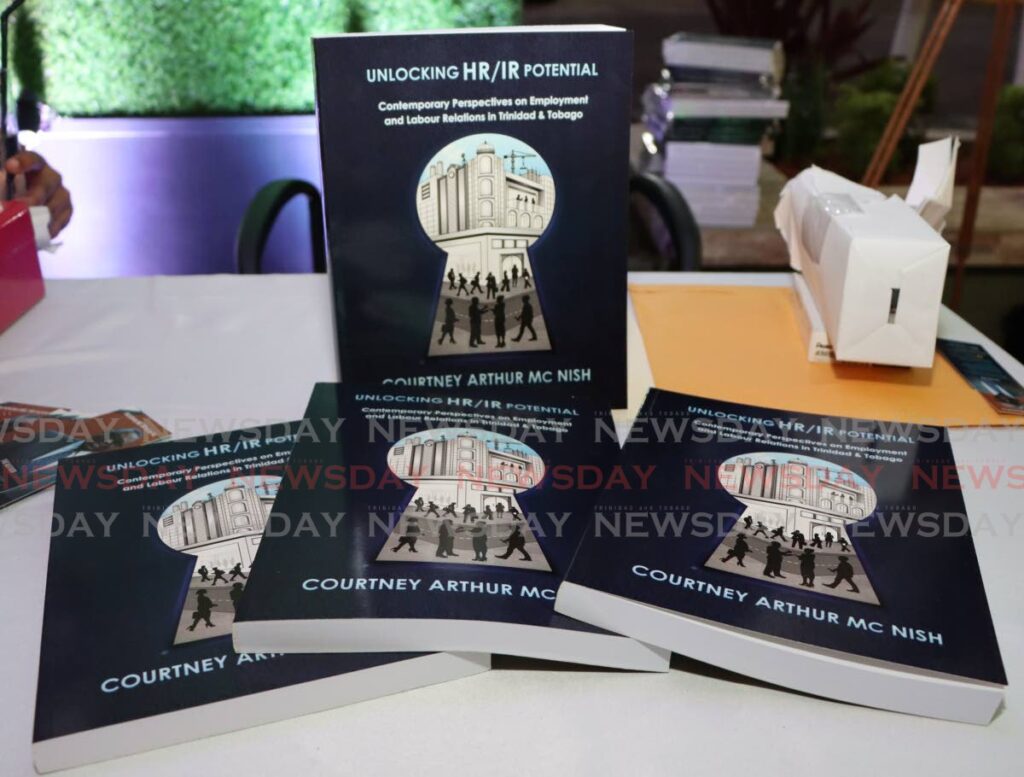HR expert McNish: Caricom, CSME objectives not achieved

After a 40-plus year career in human resources (HR) and industrial relations (IR), Courtney McNish has some strong opinions on the region's HR and IR landscape, founded in years of practice.
For instance, he says the objectives of Caricom and the Caricom Single Market and Economy (CSME) have not been achieved.
Speaking with Business Day on July 6, McNish said, “We really do not have a true common market. The free movement of labour and skills is not as free as we would want, and there continue to be obstacles and problems in that regard.”
His statement came as Caricom celebrated its 50th anniversary last week, when the issue of CSME was discussed in the three-day conference hosted by TT.
McNish said in terms of HR and IR systems in TT as well as the wider Caribbean, everyone is at different points of advancement and development.
He said, "TT has a long history of labour legislations, its industrial court is over 50 years old and has a well-developed jurisprudence.
"But TT’s industrial relations is different from everyone else, it is very generalised. Similarly, Jamaica has a well developed system as well as a specialised tribunal that treats with labour issues.
"On the other hand, Barbados has enacted its employees’ right legislation so that you don't even have to go to a specialist court, you could enforce those rights in an ordinary high court.”
There is no standard that the group of countries is working to achieve, he said.
Last month McNish launched a book – a compilation of his experience in the local and regional landscape.
The book, Unlocking TT's HR and IR Potential, is a collection of articles written and published in the business section of Newsday from 2015-2023. It looks at a wide range of topics such as workplace conflict resolution; roll call on gender and age bias; and re-crafting HR systems in TT.
McNish has had an extensive career. He was VP, HR of Caribbean Airlines; HR manager at the TCL Group, where he was responsible for the group’s HR and IR functions throughout the Caribbean; and a member of the Police Service Commission.
He also worked with Ansa McAl group, as the HR manager of Carib Brewery, and IR manager at the Airports Authority.
McNish said it was early in his career that he was introduced to the principles of industrial relations.
“I was an activist for people’s rights, and I got to attend negotiations with these very senior and seasoned trade unionists. It is here that I was introduced to any form of human-resource management,”
McNish is the CEO and principal consultant of Human Resource Technologies Ltd, where he manages a large portfolio of private- and public-sector clients.

In 2022, he received the Glen Wilson Award for Industrial Relations Excellence from the Human Resource Management Association of TT.
McNish is currently researching the social justice issues that drive labour law legislation, as well as reliance on ILO conventions. This would look at the maternity legislation, workman’s compensation and legislation on minimum wages.
“Today, trade union activity and activism in the Caribbean is far less significant than it was while my career was being developed.”
He asked: when last did you hear of a serious strike?
This can be for two reasons, either the parties are findings
This could be for two reasons: either the parties are finding ways to settle, or the influence of trade unionism has been significantly reduced.
“Trade unions are very useful and needed entities in our society. Besides addressing issues at the workplace, they also address social justice issues. They try to level the playing field,” McNish said, as he underscored their importance in society.
He also spoke about labour-law reform and the minimum-wage issue.
He said TT’s labour laws are 60-70 years old, so how could they be relevant in today’s socio-economic landscape?
“It is time for the Workmen's Compensation Ordinance and the and the various schedules attached to it be reviewed. It is time the Industrial Relations Act, with some of its systems and procedures, be reviewed. Why is it that only someone defined as a worker can go to the Industrial Court? The Retrenchment and Severance Benefits (Act), that's a 1985 act. I am not sure that the formula which was conceived back then would still be applicable today,” he said.
On the minimum wage, he said his concern is not necessarily the amount, but where the law is effectively enforced. The wage does not only include payments – weekly, fortnightly or monthly – but also attached conditions such as sick leave and vacation leave.
He added that there are countless people working in TT who do not have access to these conditions.
Last month the Joint Trade Union Movement (JTUM) called for an increase in the minimum wage from $17.50 to $30.
McNish also weighed in on the updated OSH Act, saying it needs to be adjusted, as there are issues of corporate manslaughter and corporate murder – death due to employer negligence.
He said the current law could be amended to include a provision to cover this.
Outside of work, his passion for basketball is his driving force. He has served as president of the National Basketball Federation.
Hailing from East Dry River, Port of Spain, McNish – the eldest in his family – described his childhood as humble, as he grew up in a socially depressed area.
He said basketball had been a constant in his life.
“I recall as a child, I paid very little attention to my academics. And you know you needed your subjects to get a good job,"
"In school, when I got my results, I only got two or three subjects. My mother pushed for me to go back and repeat subjects – with the stern warning of no more basketball.”
But in fact he's remained involved in the sport throughout his career.
McNish said his late parents were an integral part of his career and dedicated his recent book to them.
McNish is also currently involved in his family’s Merikin heritage as the chairman of the Merikin Commission and The McNish Trust.
“Ten years ago, my brother and I started researching our family history. I knew my family had ancestral lands in Moruga, but I wasn’t aware of the extent of my roots and history.”
The research revealed that McNish is a sixth-generation direct descendant of the Merikins who settled in Sixth Company, Moruga.
The arrival of the Merikins in Trinidad goes back to the Forgotten War of 1812-14 when runaway American slaves were first encouraged to join the British fighting forces.
A major enticement for their enlistment was the promise of freedom. Some of the formerly enslaved soldiers and their families were given land in the Company Villages in south Trinidad.
McNish also shared that through the Merikin Foundation, he is trying to work with the Ministry of Education to incorporate Merikin history as part of the curriculum in secondary schools.
As part of his future goals, he shared that he is currently working on another book which will be published next year. The book will look at the social justice issue in TT and the wider caribbean.

Comments
"HR expert McNish: Caricom, CSME objectives not achieved"